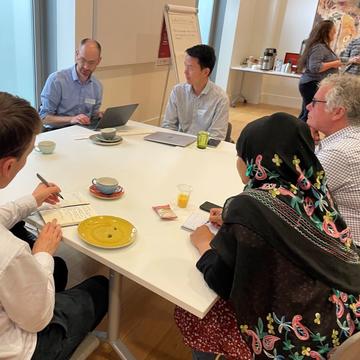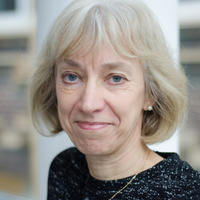One world: interdisciplinarity and collaboration in earth observation
Data from earth observation can offer critical insights into some of our world’s most significant challenges; from migration and deforestation, to greenhouse emissions and sea level rise. As part of the Division’s flagship Common Ground Seminar series, researchers from the Social Sciences Division and beyond came together earlier this month to explore how social scientists can contribute to major challenges in the field of earth observation, through interdisciplinary research activities and engagement with non-academic partners.

Researchers and collaborators in conversation at the Common Ground seminar.
The Trinity Term session of the interdisciplinary seminars welcomed more than 30 social scientists from all career stages across the Division. Opened by Professor Heather Viles, who spearheads the series, and featuring opening provocations from Dr Simon Jackman and Professor Michael Obersteiner, the session saw subject experts sharing their research agendas and potential avenues for future collaboration, supported in part by funders’ increasing moves towards supporting multidisciplinary research.
Challenges and opportunities for collaboration
A number of key challenges were explored, including the need to train more researchers in the use of satellite imagery; to address data privacy and integrity issues; and to ground-truth earth observation data (by validation through observation and measurement ‘on the ground’). Participants also highlighted the pressing need to tackle inequalities in access to earth observation data, and their social and political impacts.
Collaboration with partners – both research and non-academic – was also identified as critical to developing solutions that could bring about real change. Attendees discussed the need to involve stakeholders more fully in conversations with data providers at an early stage, and to improve capacity in end users in order to help them get the best from earth observation data. It will also be key for policy-makers to have increased understanding of earth observation data, particularly in light of the rapid technological developments in the field and the challenges this presents. Discussions also highlighted the need to build to capacity among policy professionals in using this type of data in order to co-develop solutions.
It was agreed that applications for satellite data lag currently far behind the volume of earth observation data available, and that there are real opportunities for social scientists and their partners to explore how interdisciplinary working and partnerships could maximise its potential to make positive impact in the world. There were lively discussions around opportunities for Oxford’s social scientists’ engagement with earth observation data – for example, exploring how to improve relevant data sharing across the University, as well as training in earth observation (for internal and external users).

Professor Heather Viles
“It was fantastic to hear so many thought-provoking conversations,” reflected Professor Heather Viles, “which led to a wide range of excellent suggestions for further actions.”
Funding call for Interdisciplinary Hubs
Members of the Social Sciences Division’s Research, Impact and Engagement team, which convenes the seminar series, highlighted the Division’s recently-launched call for applications to Round 3 of the Interdisciplinary Hubs (below), which is now open for applications until 25 September.
Departments are invited to apply for up to £40,000 for an 18-month period to establish interdisciplinary communities and position them for significant external research funding.
This could provide support for this group to convene regularly and tackle some of the issues above, as well as position itself to answer future funding calls that may be directed at Space applications. This may also be an opportunity to bring in policymakers and businesses around this group to examine where major opportunities for collaboration lie.
If a group of interested leads would like to develop a collaborative call, please contact the Research, Impact and Engagement team, who would be happy to support the group's application.
Application deadline: 25 September 2024, 12 noon, all applications must be submitted via IRAMS
Funding amount: Up to £40,000
Project duration: Up to 18 months starting in November 2024
Hub lead: Must be based in a Social Sciences department


